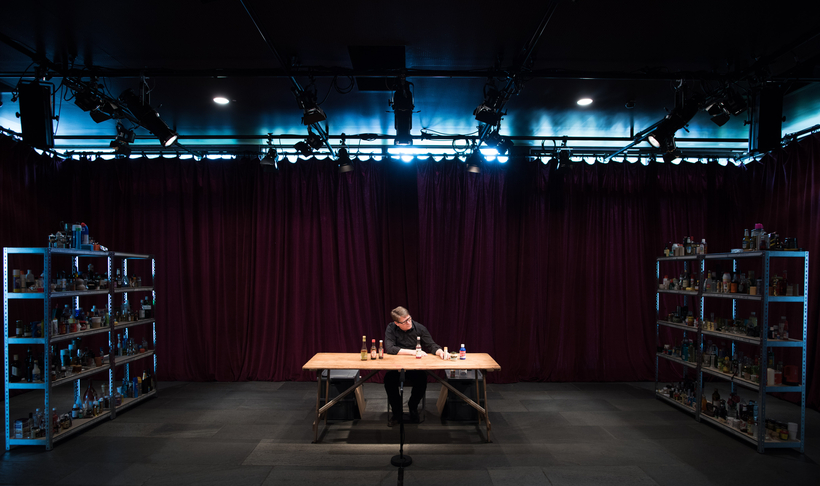“But we are spirits of another sort.” These words go unspoken in the Forced Entertainment production of A Midsummer Night’s Dream. Even so, the sight of a fairy king, queen and court represented by assorted bottles of alcoholic beverages just might set the line flitting through your mind.
This Midsummer Night’s Dream is but one of three dozen one-hour nutshell adaptations collectively billed as “Complete Works: Table Top Shakespeare.” The eponymous tabletop serves as the stage for casts of characters assembled from odds and ends you might find in your pantry or gardening shed or garage: a bottle opener, a box of powder, a paintbrush or two stuck in an empty jelly jar. Nothing anthropomorphic! Far less anything so literal as a tin soldier or figurine. Now and then (see above), a nimble mind may pick up a humorous or symbolic suggestion. As for the live element, one lone actor sits behind the table, narrating, identifying the “players,” and moving them here and there, like Fate, to show what’s happening.
The eponymous tabletop serves as the stage for casts of characters assembled from odds and ends you might find in your pantry or gardening shed.
Based in the southern Yorkshire city of Sheffield, the six artists who make up Forced Entertainment have been pursuing their theatrical experiments for an astonishing 35 years. Low-tech to the max, their “Table Top Shakespeare” has been catching audiences off guard in theaters around the world since 2015. These are by no mean the swiftest adaptations on record, not by a long shot; in performances by the Reduced Shakespeare Company, three actors whip through 37 plays, in costume, in a madcap 97 minutes. But from Sheffield come spirits of another sort. For concrete ingenuity, their theater of inanimate objects is in a league of its own.
Touring being off the table now, the company has lately embarked on an At Home edition, screening live and on demand on its YouTube channel through November 30. Farewell the red velvet that dresses up playhouses with its flourish of pomp and circumstance! This is lockdown theater, direct from a player’s home to yours, and these are plain-spoken folk, impatient with airs and graces.
Of “poetry,” they lay on none. Rather than intone, they paraphrase in the Happy Hour English of the corner pub, forgoing all familiar quotations. In fine points of the plots, Regius Professors in attendance may note certain departures, not always inconsequential, from the folios and quartos they pore over at Oxbridge. But as the melancholy Dane might say, “Let be.” Who will deny the glory of Shakespeare’s language? Forced Entertainment’s “Table Top Shakespeare” strikes a populist blow for the parity or even the primacy of story, the seed from which the fine words flower.
Matthew Gurewitsch writes about opera and classical music for AIR MAIL. He lives in Hawaii

